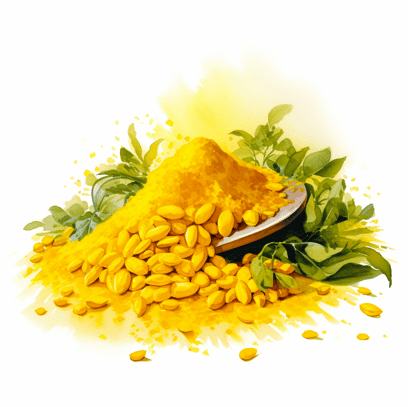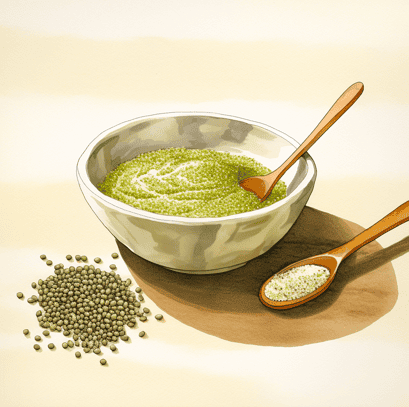
Navigating the maze of plant-based protein powders can feel overwhelming, especially when you’re trying to pick the best one to enhance your beauty and health routine. This breakdown of pea protein vs hemp protein will guide you through choosing the right protein for your needs.
Hi, I’m Hazel
I gave up on skincare after years of issues with acne and sensitive skin.
But after going plant-based, my skin cleared up and even started to glow. Now I help women reveal their natural beauty with simple, delicious plant-based food.
I also used to be a nurse, and love nerding out on nutritional science (high-quality science, that is).

As usual, this post is based on the strongest nutritional evidence I could find with a focus on the simplest, most delicious foods
…because who has time to waste on anything less?
The quick version:
Pea protein powder, derived from yellow peas, is celebrated for its high protein content and its ability to support muscle repair and growth. Hemp protein powder, made from hemp seeds, is valued for being a complete protein source with benefits for heart health due to its fiber content and essential amino acids. Both are excellent plant-based protein sources for a vegan diet, aiding in overall health and muscle maintenance
The Power of the Pea
Pea protein powder, sourced from yellow peas, is an increasingly popular choice among those following a vegan diet.

High Protein Content
Pea protein is renowned for its ability to support muscle protein synthesis and muscle repair, crucial for anyone looking to enhance their physique and skin elasticity through improved muscle tone.
Allergy-Friendly
A significant advantage of pea protein is its low allergen profile, making it a safe option for those with dietary restrictions and sensitivities.
Nutritional Powerhouse
Rich in iron and arginine, pea protein helps fuel your workouts and supports a healthy glow from within, aiding your body’s ability to stay energised and vibrant.
Hemp: A Heart-Healthy Option
Hemp protein, made from the hemp seeds of the hemp plant.

Complete Protein
Hemp protein offers a rare advantage for plant-based diets: it contains all essential amino acids necessary for human health, making it a standout complete proteinchoice for ensuring comprehensive nutrition.
Rich in Fibre and Omega Fats
Besides protein, hemp protein is loaded with dietary fibre and omega fatty acids, which help improve digestion and cardiovascular health, directly impacting your skin’s health and appearance by promoting clear, well-hydrated skin.
Supports Heart Health
Regular consumption of hemp protein can aid in reducing high blood pressure and improving overall blood flow, factors that are crucial for long-term health and youthful skin.
Nutrition: Pea Protein vs Hemp Protein
When comparing pea protein and hemp protein, each has its strengths tailored to different health and beauty needs.
Protein Quality and Content
Pea protein is ideal for those looking to increase muscle mass and strength, thanks to its rich profile in grams of protein and ability to support muscle growth.
Hemp protein, while slightly lower in protein per serving, offers a balanced spectrum of amino acids essential for overall wellness.
Taste and Convenience
When choosing between pea protein and hemp protein powder, taste and convenience is important too!

Taste: Palate Pleasers or Acquired Tastes?
Pea proteins has a neutral taste, making it a good choice for those who prefer their protein powder to blend seamlessly with other ingredients in smoothies and shakes.
On the other hand, hemp protein has a distinctive nutty flavour that can be an acquired taste, but it adds a rich, earthy note to recipes, which some may find appealing.
Texture: Smooth vs. Gritty
The texture of pea protein is typically smoother and mixes well into liquids, resulting in a creamier texture in beverages and baked goods.
Hemp protein powder, while being a fine powder, tends to have a grainier texture, which might not dissolve as easily but offers excellent thickening properties for hearty dishes.
Versatility: Flexibility in the Kitchen
Pea protein shines in its versatility for use in both sweet and savoury dishes due to its mild flavour and fine texture. It’s a great option for protein bars, energy balls, and baking.
Hemp protein, with its robust flavour, is a great option for those looking to add a nutritional boost to smoothies, oatmeal, and even savoury recipes like veggie burgers, making it a versatile plant-based option.
Suitability for Various Diets
Both proteins are excellent plant-based options, but your personal preference might dictate the choice depending on how you plan to use them in your diet. Whether you lean towards pea protein for its blending abilities or hemp protein for its and omega fats, each has its place in a health-conscious kitchen.
The Advantages of Eating Both
Diversifying your protein intake with various plant-based sources is not just beneficial; it’s strategic, especially for those moving away from animal-based diets.
Here’s how a mixed protein regimen can enhance overall health and wellness:

Comprehensive Nutritional Benefits
Each type of plant-based protein—whether soy, pea, hemp, or brown rice—offers a unique nutritional profile.
For instance, soy provides essential amino acids vital for muscle repair, while hemp includes beneficial fats that support heart health. This variety ensures you receive a well-rounded array of nutrients necessary for comprehensive body functions.
Enhanced Digestive Health
Plant proteins often contain higher levels of fibre compared to animal proteins, which can help improve digestive health.
A diet rich in various plant proteins ensures you get different types of dietary fibre, which aids in digestion and promotes gut health, thereby enhancing nutrient absorption and overall digestive well-being.
Muscle Maintenance and Growth
A blend of different plant proteins can be particularly effective for muscle maintenance and growth.
For example, pea protein is rich in arginine, which promotes muscle growth, while brown rice protein might help in recovery due to its gentle nature on the stomach and anti-inflammatory properties.
Reduced Allergy Risks
Mixing plant proteins can also reduce the risk of developing food allergies or sensitivities associated with consuming a single source of protein. This is particularly beneficial for those with dietary restrictions or sensitivities, as it allows for nutritional completeness without over-reliance on one type of protein.
Sustainability and Ethical Eating
Incorporating a variety of plant-based proteins aligns with sustainable and ethical eating practices. Plant proteins generally require less water, land, and energy to produce than animal proteins, contributing to a smaller environmental footprint.
By embracing a diverse protein routine, you not only cater to your body’s nutritional needs but also contribute to environmental sustainability and enjoy a diet that’s rich in flavours and benefits. This holistic approach supports not just physical health but also aligns with ethical and environmental values.
Other Plant Proteins to Consider
So exploring a variety of plant-based protein powders can enrich your plant-based diet with diverse nutrients. Here’s a look at some additional high-quality protein sources that are worth considering alongside pea and hemp proteins.
Soy and Brown Rice Proteins: Complete and Gentle
Soy protein stands out as a robust source of protein offering a complete amino acid profile, making it comparable to animal proteins in nutritional value. It’s a high-quality protein source that supports muscle development and repair.
Brown rice protein, known for being gentle on the stomach, might not be a complete protein but is often paired with other proteins to boost its amino acid profile and effectiveness.
Mixing and Matching for Maximum Benefit
Combining various sources of protein, like pea, hemp, soy, and brown rice, allows you to tailor your intake to meet your specific nutritional and digestive needs. This strategy not only diversifies your nutrient intake but also helps enhance overall nutrient absorption, providing a balanced spectrum of amino acids essential for skin health and bodily functions.
Pea protein vs Hemp protein
In the showdown of pea protein vs hemp protein, both have their unique advantages. Pea protein is your go-to for muscle development and a smoother taste, while hemp protein offers a heart-healthy profile with all essential amino acids and a distinct nutty flavour.
References
Most references below will link to the original peer-reviewed study itself. However, sometimes I will link to a video over at NutritionFacts.org instead, which is by far the single best resource of brutally transparent nutritional evidence you will ever see. Dr Greger tells a great story about the realities of the science and if I think you will benefit more from one of his videos, the link will take you there instead.
Happy nerding!
- Cao Y, Li Z, Fan X, et al. Multifaceted functionality of L-arginine in modulating the emulsifying properties of pea protein isolate and the oxidation stability of its emulsions. Food Funct. 2022;13(3):1336-1347. Published 2022 Feb 7. doi:10.1039/d1fo03372g
- Potin, François & Saurel, Rémi. (2020). Hemp Seed as a Source of Food Proteins. 10.1007/978-3-030-41384-2_9.
- Malko R, Larraza I. Microwave-Assisted, Base-Catalyzed Synthesis of Fatty Acid Methyl Esters from Seeds and Fish Oil Supplements. Lipids. 2019;54(11-12):715-723. doi:10.1002/lipd.12199
- Rodriguez-Leyva D, Pierce GN. The cardiac and haemostatic effects of dietary hempseed. Nutr Metab (Lond). 2010;7:32. Published 2010 Apr 21. doi:10.1186/1743-7075-7-32